The Legend of Zhong Kui
From brilliant scholar to legendary demon queller, discover the tragic yet triumphant tale that has captivated Chinese culture for over a millennium.
Prologue
The Talented Scholar
In the Tang Dynasty, during the Wude period, there lived a man of extraordinary intellect named Zhong Kui (钟馗), courtesy name Zhengnan (正南). Born in the mountains of Zhongnan (终南山) in ancient Yongzhou, he was a scholar of exceptional talent - described as having "文武全修" (mastery in both literature and martial arts).
Zhong Kui possessed "经纶满腹" (a belly full of knowledge) and was known for his unwavering righteousness (刚正不阿). However, he was born with a most unusual appearance - "豹头环眼,铁面虬鬓" (leopard head with round eyes, iron face with curly beard), features so fierce and unconventional that they would prove to be both his curse and his destiny.
Historical Records
Ancient texts including "Tang Yi Shi" (《唐逸史》) record: "臣终南山进士钟馗也" (I am Zhong Kui, scholar of Mount Zhongnan). The "Shi Wu Ji Yuan" (《事物纪源》) states: "钟馗者,终南进士也" (Zhong Kui was a scholar from Zhongnan).
"待人正直、肝胆相照" - He treated people with honesty and loyalty, wearing his heart on his sleeve.
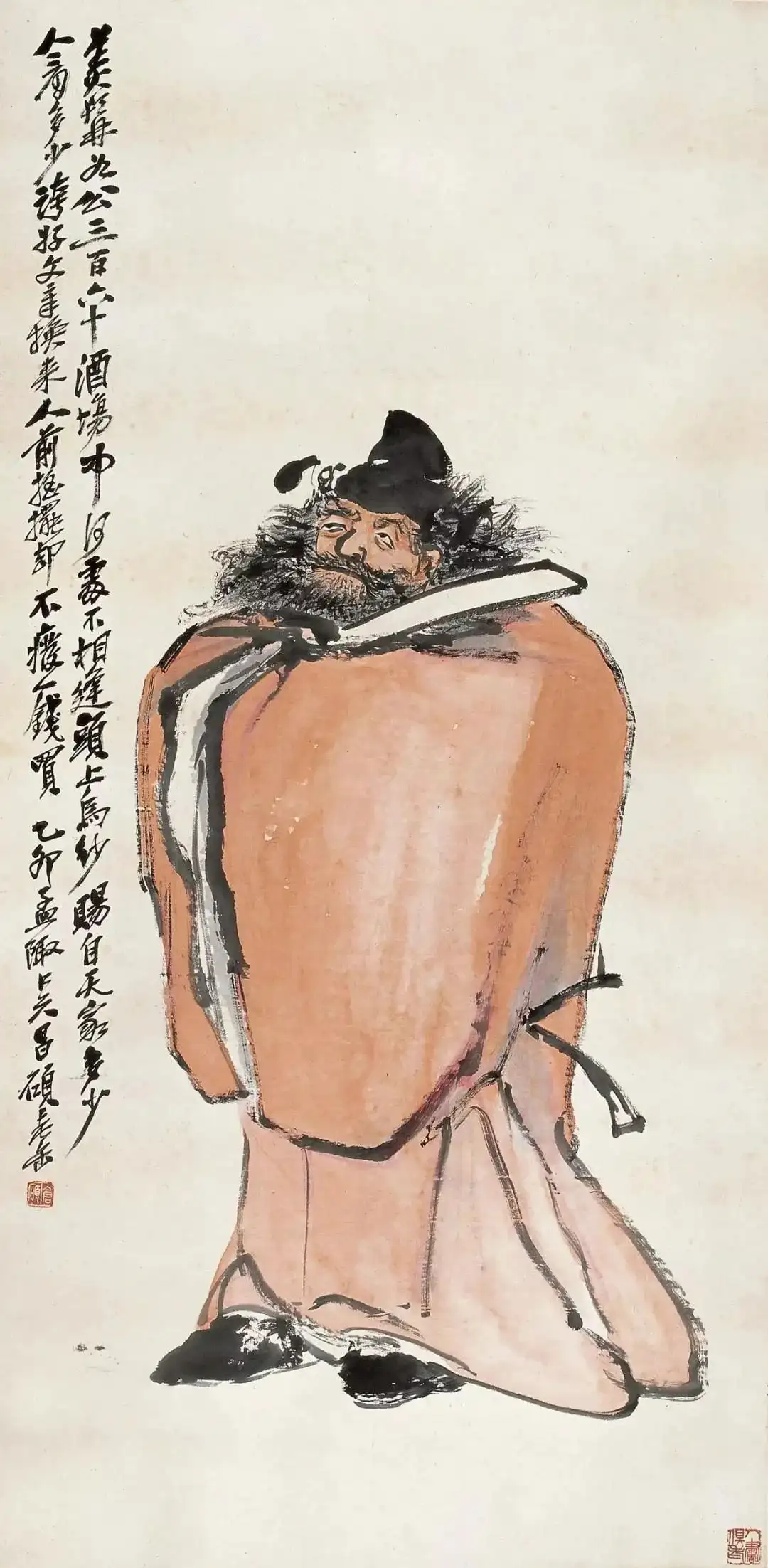
Chapter I
The Tragedy
During the Tang Wude period, Zhong Kui traveled to the imperial capital with great hope to take the highest examination in the land. His vast knowledge, eloquent essays, and sublime poetry astounded the examiners. He achieved the status of "获贡士首" (first among tribute scholars), demonstrating his exceptional intellectual abilities.
However, when the time came for the final imperial audience, fate dealt its cruelest blow. Upon seeing Zhong Kui's fierce and unconventional appearance - his "相貌奇异" (strange countenance) - the court rejected him despite his scholarly excellence. This was a devastating blow to someone who had dedicated his life to serving his country through learning.
"抗辩无果,报国无门" - His protests were futile, and the path to serve his country was blocked.
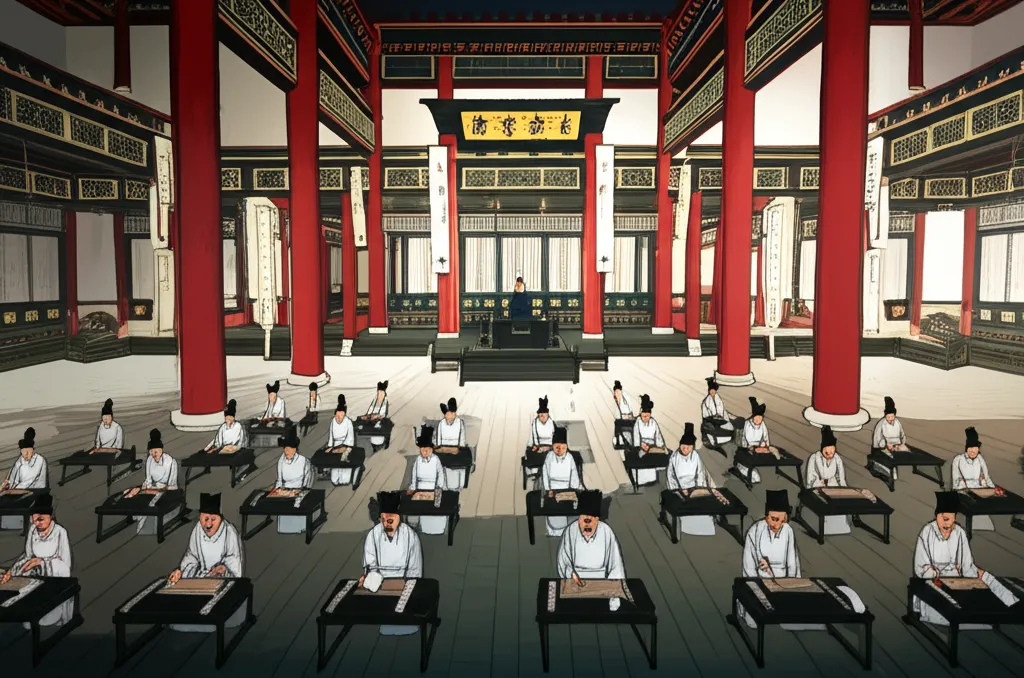
Overwhelmed by the injustice and humiliation, Zhong Kui's noble heart could not bear the shame. Following the principle of "舍生取义" (sacrificing life for righteousness), he chose to end his life by striking his head against the palace pillar ("怒撞殿柱亡"), preferring death over living with such dishonor.
Moved by Zhong Kui's tragic fate and recognizing his true worth, the emperor decreed that he be buried with the full honors of a top scholar ("皇以状元职葬之"), acknowledging the injustice that had been done.
"If merit cannot triumph over appearance, then what hope is there for justice in this world?"
Chapter II
The Emperor's Prophetic Dream
Years later, during the Tianbao period (天宝年间), Emperor Xuanzong (唐玄宗李隆基) fell gravely ill while at Mount Li (临潼骊山). The imperial physicians were baffled - no medicine could cure his mysterious ailment, and the emperor's condition worsened day by day.
One fateful night, as the emperor lay in fevered sleep, he experienced a vivid and extraordinary dream that would change the course of Chinese spiritual history forever.
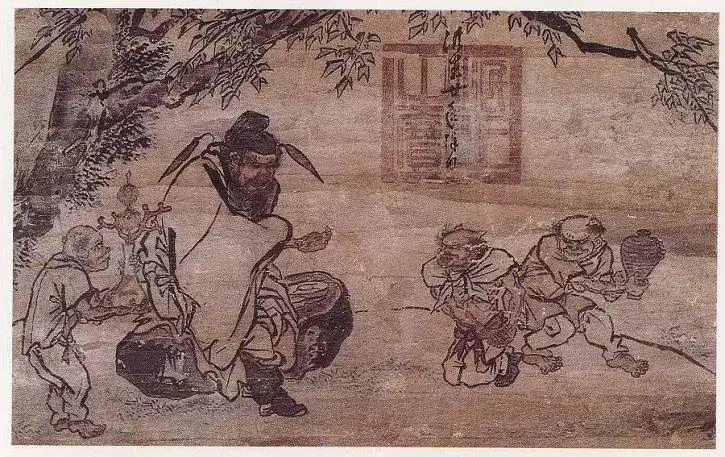
The Dream Vision
In his dream, Emperor Xuanzong saw two demons in the great hall. A small demon was running around, stealing and causing mischief, when suddenly a large, fearsome demon appeared. This giant demon caught the small one, gouged out its eyes, and devoured it completely ("大鬼抓住了小鬼,挖了小鬼的双眼,撕巴撕巴几口便装进了肚子").
The emperor, both frightened and curious, observed this terrifying figure: wearing a crooked hat, dressed in a blue robe with one arm exposed, sporting a beard like iron wire ("戴着一顶歪歪扭扭的帽子,穿着一件蓝袍子,还露着一只臂膀,络腮胡子铁丝一般支支扎扎").
Trembling, the emperor asked: "Who are you?"
The demon replied: "I am called Zhong Kui. I failed the military examination, but I vow to eliminate all demons and evil spirits from the mortal world for Your Majesty."
Chapter III
The Divine Appointment
When Emperor Xuanzong awakened from his dream, a miracle had occurred - his illness was completely cured! The emperor's health was not only restored but enhanced ("玄宗醒来之后,病就好了,而且还更健壮"). This extraordinary healing convinced him of the dream's divine significance.
Immediately, the emperor summoned Wu Daozi (吴道子), the greatest painter of the age, known as the "Painting Saint" (画圣). He described his dream vision in vivid detail, asking Wu Daozi to capture the image of this supernatural protector.
The Master's Vision
As the emperor spoke, Wu Daozi felt as if Zhong Kui was standing right before him ("吴道子感觉这钟馗似乎就在眼前一般"). In a moment of divine inspiration, he completed the painting. When Emperor Xuanzong saw it, he exclaimed that it was exactly like being in the dream together ("玄宗看后大呼画得极像,就像与自己一同在梦中见过似的").
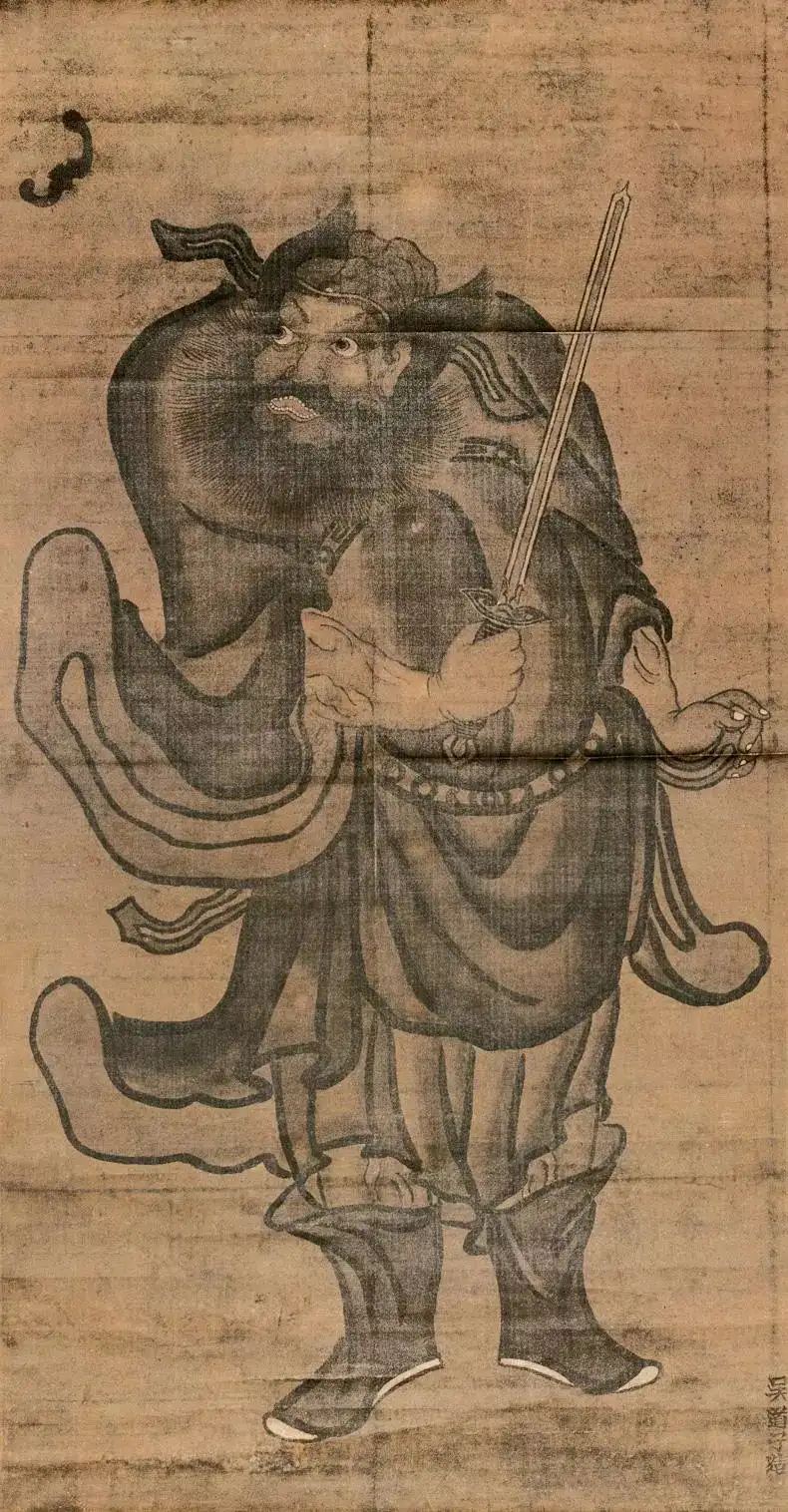
The Imperial Decree
Thus began Zhong Kui's divine mission. The emperor issued a decree throughout the empire, commanding that "《钟馗赐福镇宅图》" (Zhong Kui's Blessing and House Protection Images) be hung in homes everywhere to "护福祛邪魅以佑平安" (protect blessings, dispel evil spirits, and ensure peace).
"托梦驱鬼愈唐明皇之疾,封'赐福镇宅圣君'"
Through dreams he drove away demons and cured Emperor Xuanzong's illness, earning the title "Saint Lord of Blessing and House Protection"
Chapter IV
The Universal God
Zhong Kui's divine mission expanded far beyond demon hunting. Taoism honored him as a door guardian, and he was elevated to the rank of judge in the underworld ("封钟馗为驱鬼逐恶的判官"). His title became "赐福镇宅圣君" (Saint Lord of Blessing and House Protection).
What makes Zhong Kui truly unique among Chinese deities is his status as "万应之神" (Universal Responsive God) - the only deity who responds to any sincere request: "要福得福,要财得财,有求必应" (want blessings, get blessings; want wealth, get wealth; every request is answered).
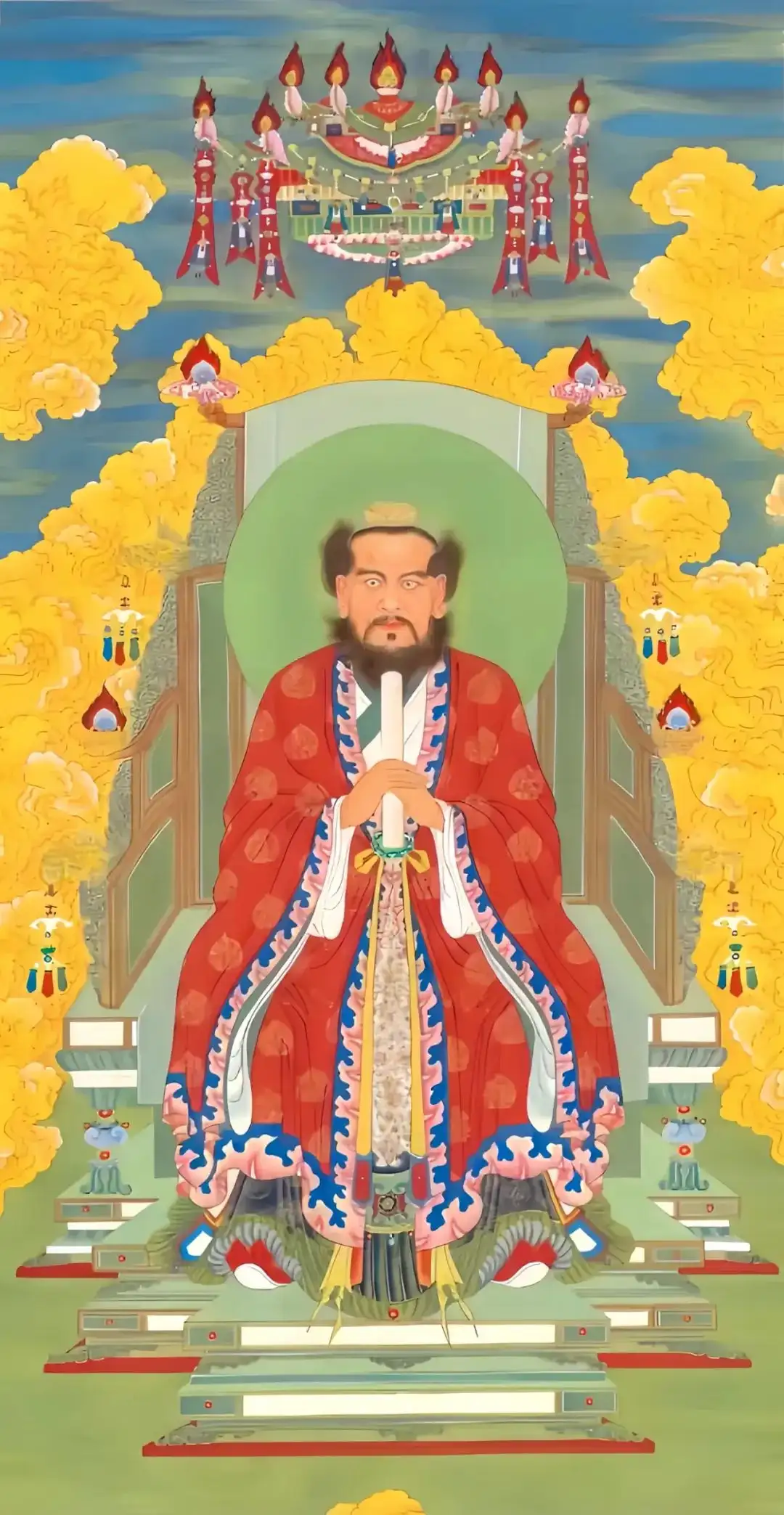
The Demon Hunter
As "镇鬼尅邪的门神" (door god who suppresses ghosts and defeats evil), Zhong Kui protects homes and appears in Nuo ceremonies as "统鬼斩妖的猛将" (fierce general who commands ghosts and slays demons).
The Universal Protector
As "禳灾祛魅的神灵" (divine spirit who wards off disasters and dispels demons), he brings fortune, protects against evil, and grants wishes to all who call upon him with sincere hearts.
Chapter V
The Eternal Guardian
From the Tang Dynasty onward, Zhong Kui's influence spread throughout Chinese culture. Palace artists and folk artisans alike used Wu Daozi's "钟馗样" (Zhong Kui Style) as their model, ensuring his image would be preserved for generations.
Today, wherever Chinese communities exist around the world - from Taiwan and Southeast Asia to modern global diaspora - people still hang Zhong Kui's image for protection, perform traditional dances in his honor, and invoke his name during festivals and important life events.
Global Influence
In Japan, Zhong Kui belief is highly systematic with dedicated shrines and roof tiles. The legend has transcended cultural boundaries, proving that stories of justice and righteousness resonate universally.
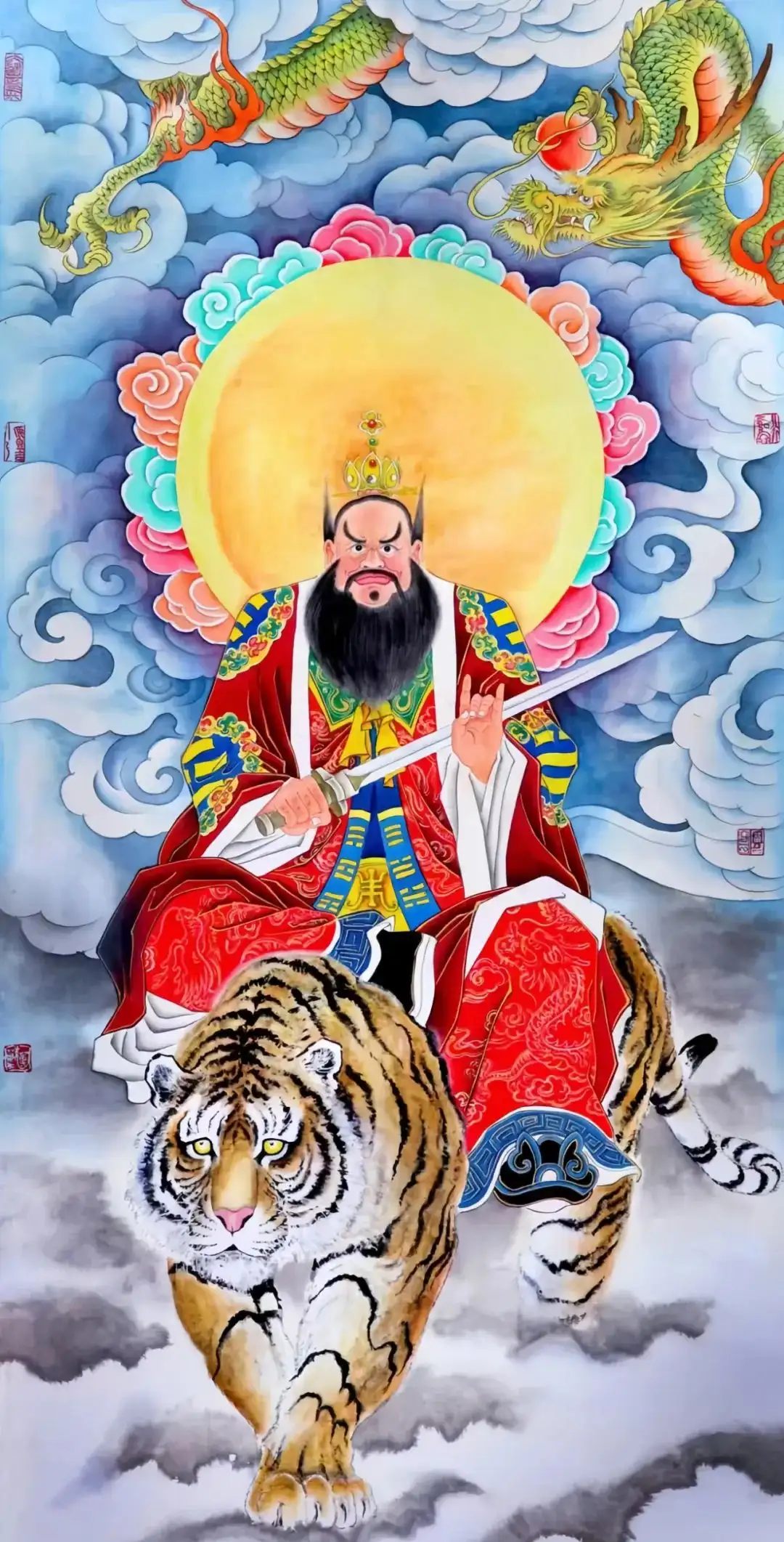
The Eternal Legacy
From a scholar's tragic death emerged one of China's most enduring and beloved deities. Zhong Kui's transformation from victim of injustice to divine protector offers hope that righteousness ultimately prevails, and that even the greatest suffering can become a source of strength for others.
"故名噪天下也!" - Thus his fame resounded throughout the world!
Continue Your Journey
Explore how Zhong Kui's legend has influenced art, culture, and modern interpretations
Cultural Legacy
Discover how Zhong Kui influenced Chinese art and folklore through three major periods
Explore Legacy →Zhong Kui in Games
Discover how Zhong Kui is portrayed and played in modern video games
Explore Games →